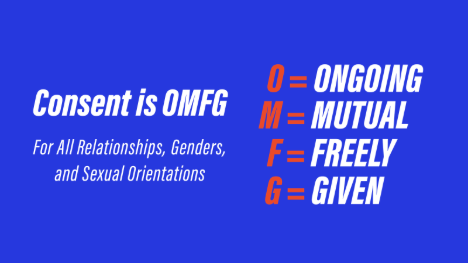Consent
Consent
TU Dublin uses the OMFG Model of Sexual Consent:

Sexual consent in defined in Irish law and to summarise, a person consents to a sexual act if he or she freely and voluntarily agrees to engage in that act.
A person does not consent to a sexual act if he or she:
- is forced, or threatened with force, or is genuinely afraid of force being used against him or herself or against another person
- is asleep or unconscious
- is incapable of consenting because of the effect of alcohol or some other drug
- is suffering from a physical disability which prevents him or her from communicating whether he or she agrees to the act
- is mistaken as to the identity of any other person involved in the act
- is being prevented from leaving at the time at which the act takes place
- consents for that person
- is mistaken as to the nature and purpose of the act
There may be other circumstances where a person does not consent.
For example:
- a person can change their mind and can retract consent at any time before or during a sexual act
- a person who does not actively resist is not automatically consenting
If you have experienced an incident that you feel was not consensual please get in touch with the Sexual Violence Prevention and Response Manager Catherine.bolger@tudublin.ie for support and advice on seeking help.
